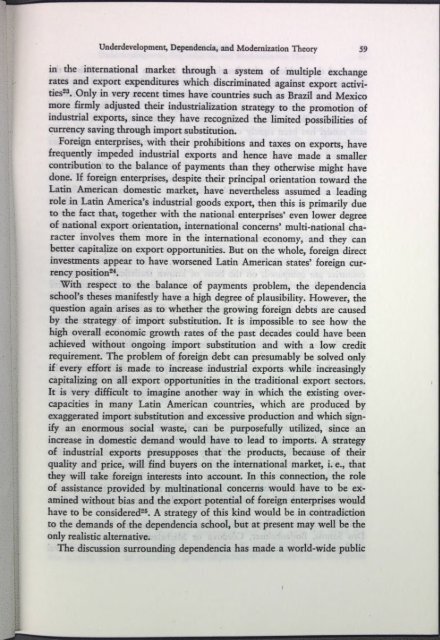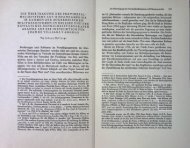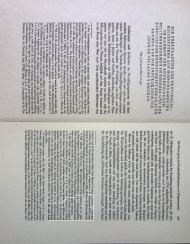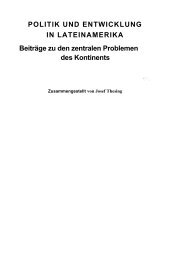9_Law and State_Volume 17
Create successful ePaper yourself
Turn your PDF publications into a flip-book with our unique Google optimized e-Paper software.
Underdevelopment, Dependencia, <strong>and</strong> Modernization Theory 59<br />
in the international market through a system of multiple exchange<br />
rates <strong>and</strong> export expenditures which discriminated against export activities23.<br />
Only in very recent times have countries such as Brazil <strong>and</strong> Mexico<br />
more firmly adjusted their industrialization strategy to the promotion of<br />
industrial exports, since they have recognized the limited possibilities of<br />
currency saving through import substitution.<br />
Foreign enterprises, with their prohibitions <strong>and</strong> taxes on exports, have<br />
frequently impeded industrial exports <strong>and</strong> hence have made a smaller<br />
contribution to the balance of payments than they otherwise might have<br />
done. If foreign enterprises, despite their principal orientation toward the<br />
Latin American domestic market, have nevertheless assumed a leading<br />
role in Latin America’s industrial goods export, then this is primarily due<br />
to the fact that, together widi the national enterprises’ even lower degree<br />
of national export orientation, international concerns’ multi-national character<br />
involves them more in the international economy, <strong>and</strong> they can<br />
better capitalize on export opportunities. But on the whole, foreign direct<br />
investments appear to have worsened Latin American states’ foreign currency<br />
position24.<br />
With respect to the balance of payments problem, the dependencia<br />
school’s theses manifestly have a high degree of plausibility. However, the<br />
question again arises as to whether the growing foreign debts are caused<br />
by the strategy of import substitution. It is impossible to see how the<br />
high overall economic growth rates of the past decades could have been<br />
achieved without ongoing import substitution <strong>and</strong> with a low credit<br />
requirement. The problem of foreign debt can presumably be solved only<br />
if every effort is made to increase industrial exports while increasingly<br />
capitalizing on all export opportunities in the traditional export sectors.<br />
It is very difficult to imagine another way in which the existing overcapacities<br />
in many Latin American countries, which are produced by<br />
exaggerated import substitution <strong>and</strong> excessive production <strong>and</strong> which signify<br />
an enormous social waste, can be purposefully utilized, since an<br />
increase in domestic dem<strong>and</strong> would have to lead to imports. A strategy<br />
of industrial exports presupposes that the products, because of their<br />
quality <strong>and</strong> price, will find buyers on the international market, i. e., that<br />
they will take foreign interests into account. In this connection, the role<br />
of assistance provided by multinational concerns would have to be examined<br />
without bias <strong>and</strong> the export potential of foreign enterprises would<br />
have to be considered25. A strategy of this kind would be in contradiction<br />
to the dem<strong>and</strong>s of the dependencia school, but at present may well be the<br />
only realistic alternative.<br />
The discussion surrounding dependencia has made a world-wide public<br />
I
















